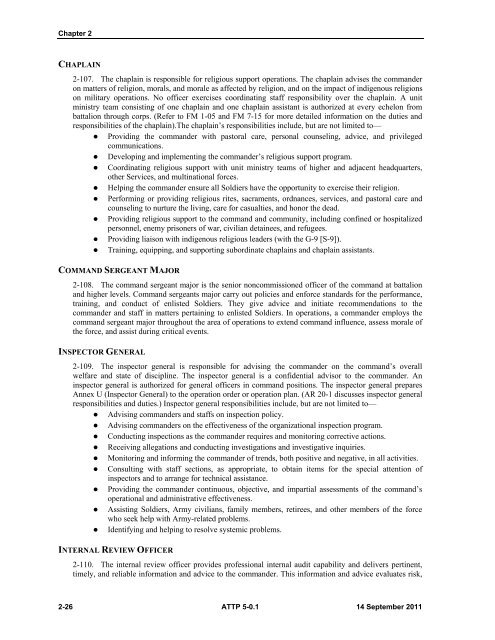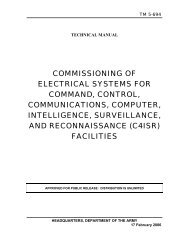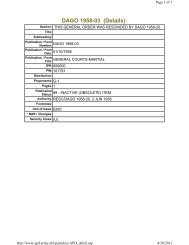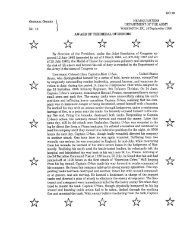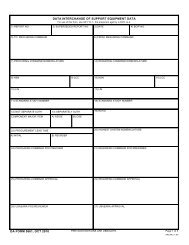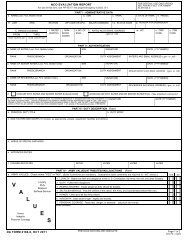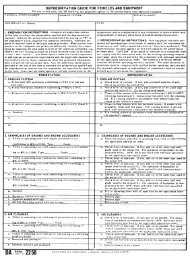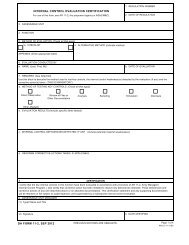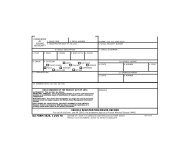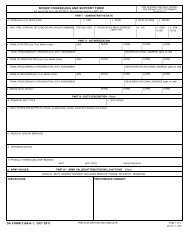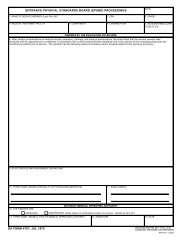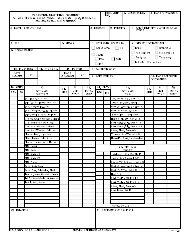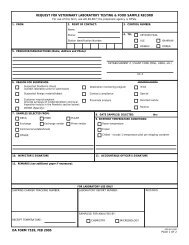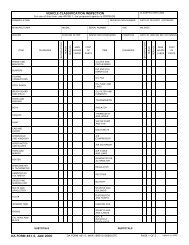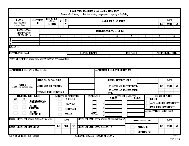ATTP 5-0.1 Commander and Staff Officer Guide - Army Electronic ...
ATTP 5-0.1 Commander and Staff Officer Guide - Army Electronic ...
ATTP 5-0.1 Commander and Staff Officer Guide - Army Electronic ...
Create successful ePaper yourself
Turn your PDF publications into a flip-book with our unique Google optimized e-Paper software.
Chapter 2<br />
CHAPLAIN<br />
2-107. The chaplain is responsible for religious support operations. The chaplain advises the comm<strong>and</strong>er<br />
on matters of religion, morals, <strong>and</strong> morale as affected by religion, <strong>and</strong> on the impact of indigenous religions<br />
on military operations. No officer exercises coordinating staff responsibility over the chaplain. A unit<br />
ministry team consisting of one chaplain <strong>and</strong> one chaplain assistant is authorized at every echelon from<br />
battalion through corps. (Refer to FM 1-05 <strong>and</strong> FM 7-15 for more detailed information on the duties <strong>and</strong><br />
responsibilities of the chaplain).The chaplain’s responsibilities include, but are not limited to—<br />
� Providing the comm<strong>and</strong>er with pastoral care, personal counseling, advice, <strong>and</strong> privileged<br />
communications.<br />
� Developing <strong>and</strong> implementing the comm<strong>and</strong>er’s religious support program.<br />
� Coordinating religious support with unit ministry teams of higher <strong>and</strong> adjacent headquarters,<br />
other Services, <strong>and</strong> multinational forces.<br />
� Helping the comm<strong>and</strong>er ensure all Soldiers have the opportunity to exercise their religion.<br />
� Performing or providing religious rites, sacraments, ordnances, services, <strong>and</strong> pastoral care <strong>and</strong><br />
counseling to nurture the living, care for casualties, <strong>and</strong> honor the dead.<br />
� Providing religious support to the comm<strong>and</strong> <strong>and</strong> community, including confined or hospitalized<br />
personnel, enemy prisoners of war, civilian detainees, <strong>and</strong> refugees.<br />
� Providing liaison with indigenous religious leaders (with the G-9 [S-9]).<br />
� Training, equipping, <strong>and</strong> supporting subordinate chaplains <strong>and</strong> chaplain assistants.<br />
COMMAND SERGEANT MAJOR<br />
2-108. The comm<strong>and</strong> sergeant major is the senior noncommissioned officer of the comm<strong>and</strong> at battalion<br />
<strong>and</strong> higher levels. Comm<strong>and</strong> sergeants major carry out policies <strong>and</strong> enforce st<strong>and</strong>ards for the performance,<br />
training, <strong>and</strong> conduct of enlisted Soldiers. They give advice <strong>and</strong> initiate recommendations to the<br />
comm<strong>and</strong>er <strong>and</strong> staff in matters pertaining to enlisted Soldiers. In operations, a comm<strong>and</strong>er employs the<br />
comm<strong>and</strong> sergeant major throughout the area of operations to extend comm<strong>and</strong> influence, assess morale of<br />
the force, <strong>and</strong> assist during critical events.<br />
INSPECTOR GENERAL<br />
2-109. The inspector general is responsible for advising the comm<strong>and</strong>er on the comm<strong>and</strong>’s overall<br />
welfare <strong>and</strong> state of discipline. The inspector general is a confidential advisor to the comm<strong>and</strong>er. An<br />
inspector general is authorized for general officers in comm<strong>and</strong> positions. The inspector general prepares<br />
Annex U (Inspector General) to the operation order or operation plan. (AR 20-1 discusses inspector general<br />
responsibilities <strong>and</strong> duties.) Inspector general responsibilities include, but are not limited to—<br />
� Advising comm<strong>and</strong>ers <strong>and</strong> staffs on inspection policy.<br />
� Advising comm<strong>and</strong>ers on the effectiveness of the organizational inspection program.<br />
� Conducting inspections as the comm<strong>and</strong>er requires <strong>and</strong> monitoring corrective actions.<br />
� Receiving allegations <strong>and</strong> conducting investigations <strong>and</strong> investigative inquiries.<br />
� Monitoring <strong>and</strong> informing the comm<strong>and</strong>er of trends, both positive <strong>and</strong> negative, in all activities.<br />
� Consulting with staff sections, as appropriate, to obtain items for the special attention of<br />
inspectors <strong>and</strong> to arrange for technical assistance.<br />
� Providing the comm<strong>and</strong>er continuous, objective, <strong>and</strong> impartial assessments of the comm<strong>and</strong>’s<br />
operational <strong>and</strong> administrative effectiveness.<br />
� Assisting Soldiers, <strong>Army</strong> civilians, family members, retirees, <strong>and</strong> other members of the force<br />
who seek help with <strong>Army</strong>-related problems.<br />
� Identifying <strong>and</strong> helping to resolve systemic problems.<br />
INTERNAL REVIEW OFFICER<br />
2-110. The internal review officer provides professional internal audit capability <strong>and</strong> delivers pertinent,<br />
timely, <strong>and</strong> reliable information <strong>and</strong> advice to the comm<strong>and</strong>er. This information <strong>and</strong> advice evaluates risk,<br />
2-26 <strong>ATTP</strong> 5-<strong>0.1</strong> 14 September 2011


